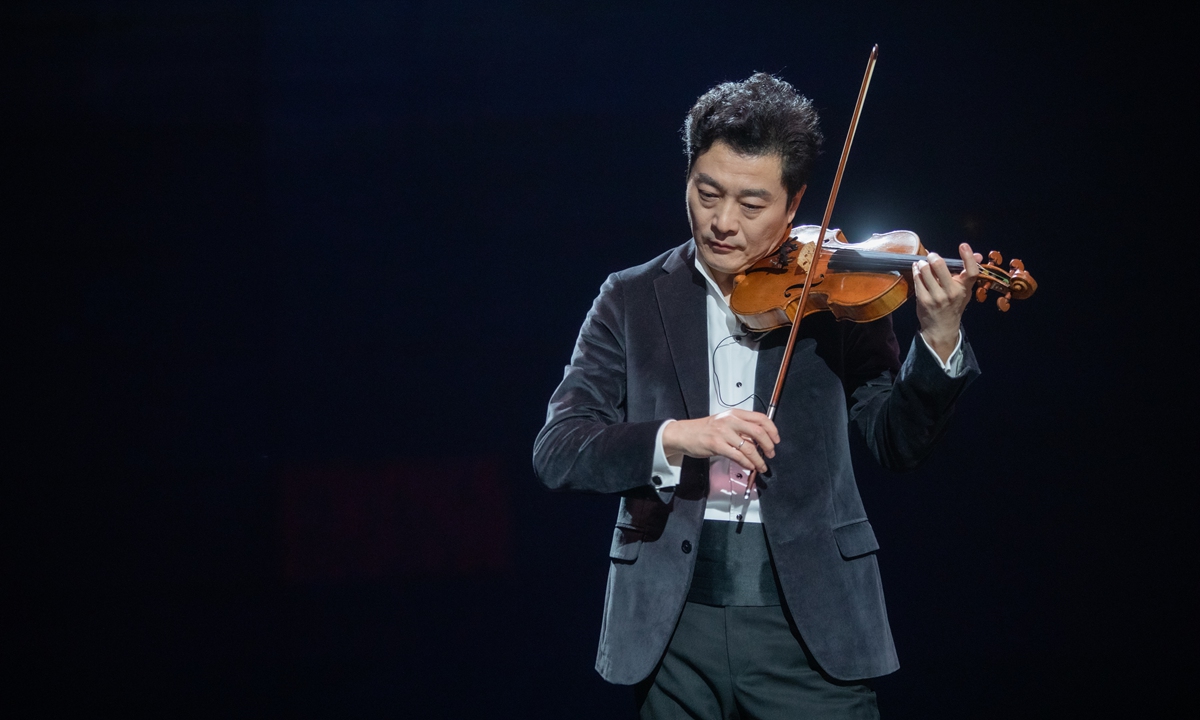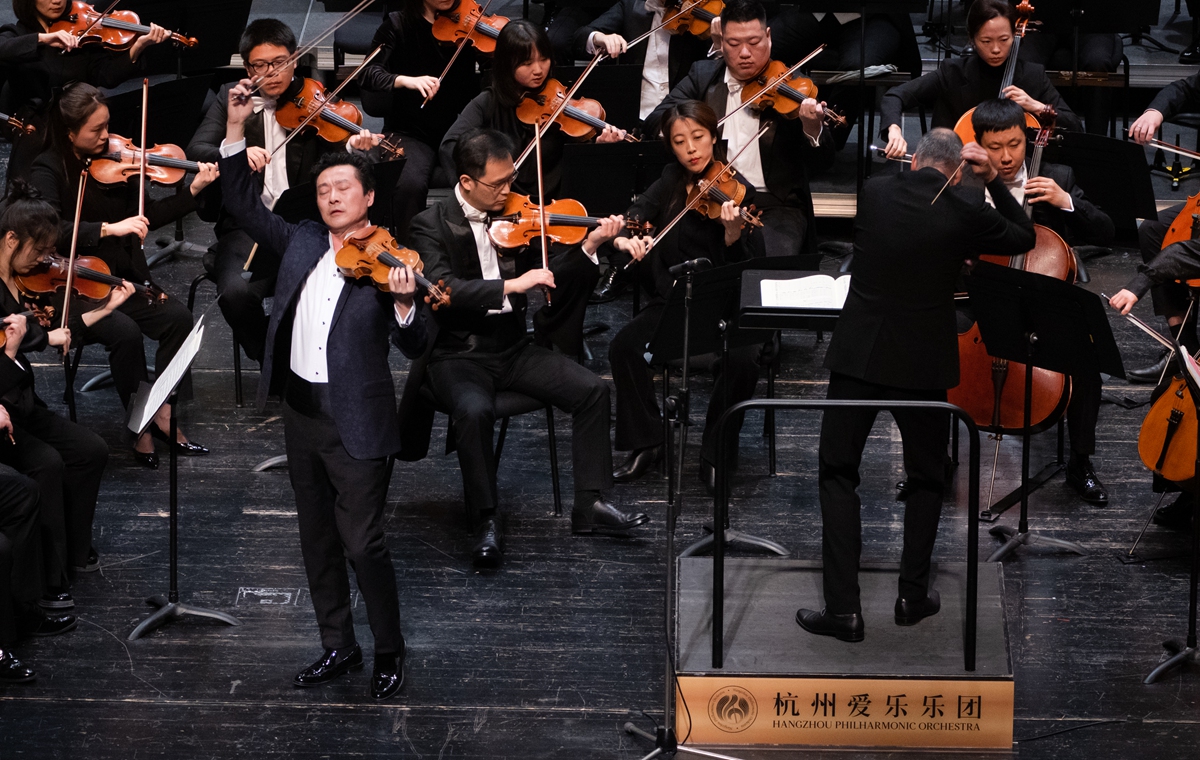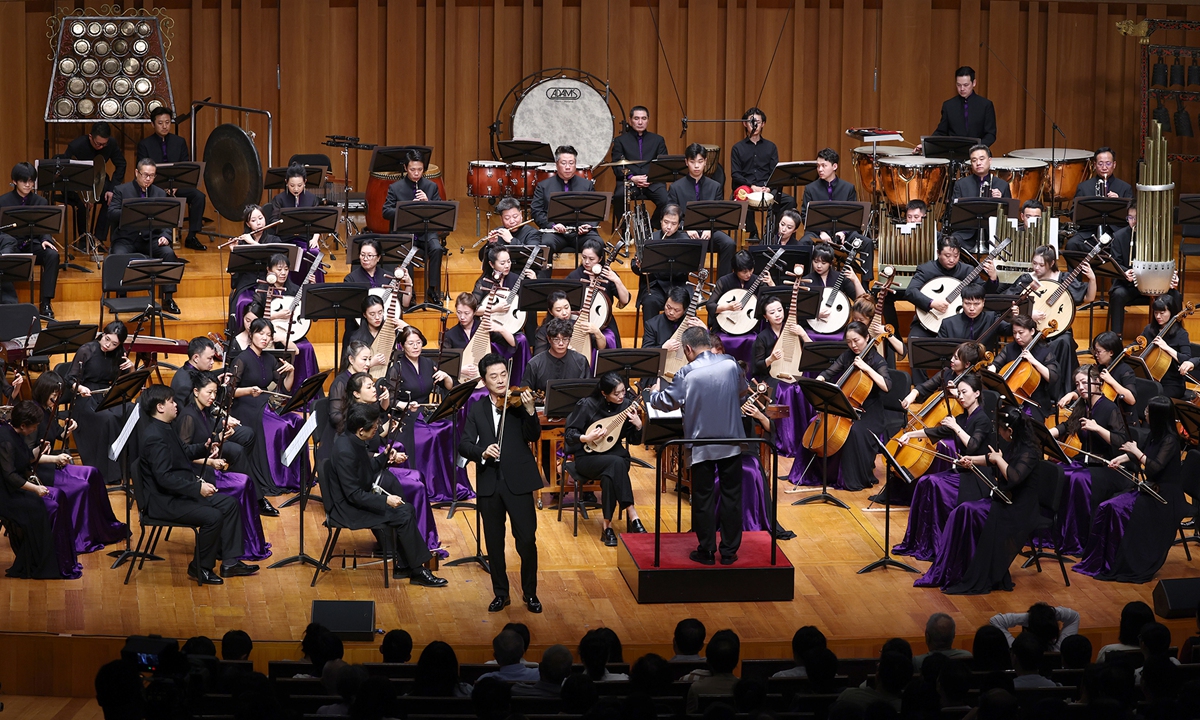Editor's Note:
Lu Siqing, a world-class violinist dubbed as the "Paganini of the East," has captivated audiences globally with his interpretation of the Butterfly Lovers' Violin Concerto, hailed as one of the most distinguished versions of the classic. At a young age, he had already secured his place among the world's top violinists through his own talent and strength. Today, he remains an active figure in both domestic and international classical music scenes. His performances are not just concerts but experiences that transcend cultural boundaries, offering listeners a glimpse into the soul of music.
The Global Times talked with Lu, who shared stories of his ties with the violin, the "chemical" reaction he made by experimenting with Chinese and Western music and his new role as a music educator.

Lu Siqing plays the violin. Photo: Courtesy of the Major Performing Arts Group
In the majestic music hall of the prestigious Tsinghua University, over 20 young musicians from Beijing and Hong Kong graced the stage and unfolded an elegant melody, performing alongside the internationally acclaimed violinist, Lu Siqing. They wove a tapestry of melodies, both foreign and domestic, enchanting an audience of hundreds with a concert that was as innovative as it was memorable.
This marked the second time that Lu conducted a master class for the "Beijing Hong Kong Tsinghua Summer Music Camp." Speaking to the Global Times, Lu expressed his belief that using music as a bridge between the students of Beijing and Hong Kong is an excellent approach. "It fosters friendship, mutual progress, and most importantly, a deep understanding of Chinese culture and the nation itself," he said.
Life with music
Lu's emphasis on music education is mirrored in his own journey, which can be seen as a model of the transformative power of musical learning.
Born in Qingdao, East China's Shandong Province, in 1969, Lu's affinity for music was evident from a young age, and his innate talent was undeniable. His father, an amateur music enthusiast, played a pivotal role in nurturing his early interest. Under his father's guidance, Lu's musical education began at the tender age of 4 and a half. His prodigious talent led to his exceptional admission to the Central Conservatory of Music's affiliated elementary school at the age of 8. At the age of 11, he was handpicked by the celebrated US-born British violinist Yehudi Menuhin to study at his prestigious music school in the UK. By 17, Lu had made history as the first Asian musician to win the gold award at Italy's "Premio Paganini" International Violin Competition, a title that had been vacant for 12 years due to stringent selection criteria. His journey then took him to the Juilliard School in the US, where he further honed his skills and emerged as a leading figure in the world of classical music.
Reflecting on his educational experiences in the UK and the US, Lu noted the differences in his learning journey. His studies in the UK provided a foundational experience, shaping his early years, while his time in the US allowed him to mature and apply his knowledge in a more creative and sophisticated manner. The lessons from his time in the UK, in his words, underwent "a process of sublimation" during his studies in the US.
While many view Lu as a favored child of destiny, his journey in music has been anything but predictable. Many of his peers have fallen by the wayside. He expresses deep gratitude to his father for introducing him to the enchanting world of music.
Lu acknowledges that not everyone can persevere on this path. After he ventured to the Juilliard School in the US, he began his career as a professional soloist. The competitiion was fierce, with hundreds vying for a single opening in a prestigious orchestra. Many of his contemporaries, faced with the choice between survival and art, chose to change careers.
His US mentors advised him that to become a soloist, one must practice in the morning, make phone calls to agents and conductors in the afternoon, and socialize in the evening. Lu sent his recordings and resumes to numerous agencies, only to be met with silence, which was disheartening. It was his teacher's advocacy at the Aspen Music Festival and School that secured him a performance opportunity, leading to gradual recognition. Many give up in this process.
"Pursuing music has taught me that in anything, persistence pays off," he said.
Lu Siqing performs with the China Broadcasting Chinese Orchestra at the National Centre for the Performing Arts in Beijing on August 10, 2024. Photo: Courtesy of the Major Performing Arts Group
Musical chemist
Lu is often described as "romantic yet rational" on stage, a testament to his precise yet expansive playing style. He said that the highest form of music is logical and thoughtful, akin to geometry or architecture requiring precise calculations, with structure, symmetry, and balance infused with philosophical thought. The arrangement of dynamics, rhythm, and tempo is the result of the musician's ingenious conception, aligning with the audience's heartbeat, feelings, and thoughts. It is this kind of music that resonates with listeners worldwide.
Such meticulous calculation requires rigorous training. Despite 40 years of experience, Lu still practices three to five hours a day.
As a performer, he views his role as a process of secondary creation. Once the composer has written the notes, it is the performer's task to bring them to life, infusing them with personality and individuality. This is the charm that attracts music enthusiasts to compare different interpretations of the same piece. Notes are static, but music is dynamic, and it is this vitality that keeps audiences engaged.
Lu's understanding of performance is also evolving. "When I played Butterfly Lovers 20 years ago, it was with the simplicity and restlessness of youth. Now, my approach is more composed. I used to aim to impress with brilliant technique and speed, but now I focus on conveying details and narratives, telling a story to the audience," he said.
Every piece Lu performs is not about imposing his interpretation but about guiding the audience into the music, allowing them to reflect on or imagine their own stories. Thus, when 1,000 people listen to music, there are a thousand different interpretations of the Butterfly Lovers, each unique to the listener.
"People often say that musicians are engineers of the soul. What I most want to do is this: If a person comes into the concert hall after a busy day, exhausted in body and mind, two hours later, they can walk out with a joyful mood and rejuvenated spirit," he said.
As a Chinese violinist, Lu has taken on the responsibility of introducing Chinese culture and music to the world.
He said that Chinese music, deeply influenced by Chinese culture, is characterized by its monophonic and horizontal development, expressing a talent for emotional and artistic expression.
Chinese music, he says, is like the blank spaces in a Chinese painting, offering a space for imagination and introspection. This is why experts often describe Chinese music as "having a Zen quality."
On the other hand, Western music is more philosophical, emphasizing rules and standards, with a stronger emphasis on personal expression.
After numerous international performances, Lu has observed that foreigners' appreciation of Chinese music mirrors the Chinese experience with Western music, both offering an exotic charm. As more Chinese musicians gain prominence on the global stage, performing Chinese works, foreign musicians are increasingly curious about the emotional depth and differences between Chinese and Western music. This curiosity leads to a deeper understanding and appreciation of Chinese music.
Collaborating with foreign orchestras to perform Chinese compositions has been an intriguing experience for Lu. The interaction between different musical sensibilities is fascinating. Foreign musicians approach all music with a professional and standardized understanding, while Chinese music often involves spiritual expression. This exploration is part of the creative process, much like conducting scientific experiments, where different approaches to the same musical phrase yield varied effects.

Lu Siqing performs with the Hangzhou Philharmonic Orchestra in Hangzhou, East China's Zhejiang Province on February 3, 2024. Photo: Courtesy of the Major Performing Arts Group
Reaching the next generation
To fulfill his vocational objective, the violinist has accepted his social role and contributed much time as well as energy to musical education while still carrying out performances on stage.
Currently, Lu serves as the headmaster of a branch of the Yehudi Menuhin School, a world's renowned music school in the UK. The branch is located in his hometown of Shandong Province. Alongside his leadership role, Lu has also been named a professor of violin at the school, instructing playing techniques and guiding the musical aesthetics of the younger generation.
Since his career as an educator started, Lu has gotten busier but considers it is worthy as he can garner a new sense of achievement from his new role - witnessing his students embracing a bright future and growing as splendid musicians.
"When I perform on stage as a soloist, my satisfaction comes from the enthusiastic reaction from my audiences and the experience of sharing beloved music with them. But now, I have felt a new kind of satisfaction," Lu said, sharing his fresh feeling with the Global Times. This is also another source of motivation for him to devote himself to a career as an educator.
Lu said his ultimate goal is to bring classical music into more people's lives and hearts. This goal is broad, and the challenge is to make classical music accessible and appreciated within China. There are many ways to do this, including cross-genre collaborations and collaboration with different musicians, such as cooperating with a French erhu player to perform the Butterfly Lovers. Beyond that, Lu also participates in Chinese and foreign music exchanges and music festivals.
What he desires most now is not the applause of the audience, but for everyone to forget their worries during the concert, to calm their hearts and discover the purest and most beautiful emotions within. "I hope to bring the beauty of music to more people through different channels, which is very fulfilling for me," he said.
In the grand halls of music, where notes soar and hearts resonate, Lu continues his journey, not just as a musician, but as a cultural ambassador, bridging the worlds of the East and West through the universal language of music.
Liu Ming and Zhang Yashu contributed to the story



